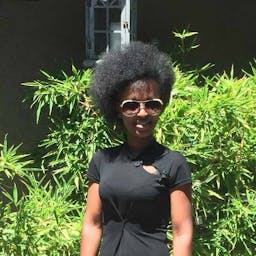Challenging the Taboo on Menstruation to Empower Women
May 28, 2019
Story
Carrying a heavy burden of shame during periods in her 16s transposed Blandine Umuziranenge into a storyteller for positive change.
It was two years after my first periods; two years of not asking for sanitary pads by their name, trying to get a better name for my parent’s ears _calling them hygiene products, school materials or even clothes_ to get what I want!
However, I knew neither how to talk about my need for sanitary pads nor how to use them. The first day of my first periods I had been afraid to ask my mother what happened to me because I thought that it was because I sat on a tree, and that may be its branches injured me! The second day, I realized that that blood was not normal and I had to discover how to stop it or how to hide it by myself but all my clothes became a mess and I started cutting them into pieces to change one another every 30 minutes which caused me embarrassment when hanging pieces of my clothes outside to dry after washing them.
Despite that burden of shame I went straight to my neighborhood friend who was the same age as I was and asked her if she ever experienced what I was feeling and what I was seeing on my body. She told me her shameful experience when she had to use rags and mattress stuffing before she knew about sanitary pads and taught me how to use them.
18% of women and girls in Rwanda missed out on work or school last year because they could not afford to buy menstrual pads. Apart from the personal injustice stemming from menstrual taboos and the larger issues of health and dignity, that’s a potential GDP loss of $215 per woman every year in Rwanda – all because of a lack of access to menstrual pads, according to Sustainable Health Enterprises.
Social stigma and cultural taboos about menstruation had a big impact in these girls missing work or school and will continue to increase the number of school dropouts if we stop raising our voices about this issue. One thing that has been common in my community is that when you go to buy a pad they wrap it in multiple envelopes or even cover it with newsletters and pack it as if it was shameful to carry it!
It’s that same shame that the person in the boutique reflects on someone buying a pad that my father reflected on me when I started asking him money for buying sanitary pads every month. And yet I had to start asking for that money one week before to bear with the fear that his responses caused me, and there is a time I could not forget about the words I got in reply early morning standing on the stairs where he passes every day for work to ask for that money again before he leaves: “Stop those things that make you ask me 1$ every month!”
After asking myself a lot of questions about ‘why me’ in that situation, I thought about ‘how me’ for all Rwandan girls out there in the same situation or even worse than mine. I thought about the shame that natural part of becoming a woman is putting us to; the shame that was causing us wish not to be girls anymore; the shame that made us forget about the gift of reproduction we have been given.
Some of my colleagues could miss class some days because they don’t have hygiene products or even miss class working for money to buy pads. Luckily, me I had to take pads on credit from my neighbor’s boutique or a debt from my friends, and pay back from holiday jobs, and this helped me to not miss any class because of my periods.
Since then I could call myself the child of the community! I had to know what to ask and to whom to ask it to! I had to remember everyone’s contribution to my life for which I owe success! I realized that however important my problem may be, I could not get support from the one I thought was in charge of me! I have been humbled to get help from all those kind people around me and swore to give back to the community.
Remembering my challenges about menstruation, I know I have to work hard to be successful in my life and protect other girls out there to never get the same discouraging reply on their turns. In the line of my vision, I can’t stop equipping parents with important information to provide the most affectionate and psychologically supportive environment to their children.
My initiative in Cosmos contributes in creating a good environment for girls to turn their periods into something that can exist without shame, through publications and activities which communicate about the education and hygiene products girls need to handle their menstrual cycles each month, with the goal to see all school-aged girls learning every day not only in Rwanda but in the whole Africa without having to worry about their monthly cycle at school.
We also plan to start an incubator for young women and girls to meet and discuss about their challenges about menstruation as they learn how to make pads for themselves and other school girls to break the silence among girls about menstruation and empower them economically for them to see their periods as a source of pride and power.




